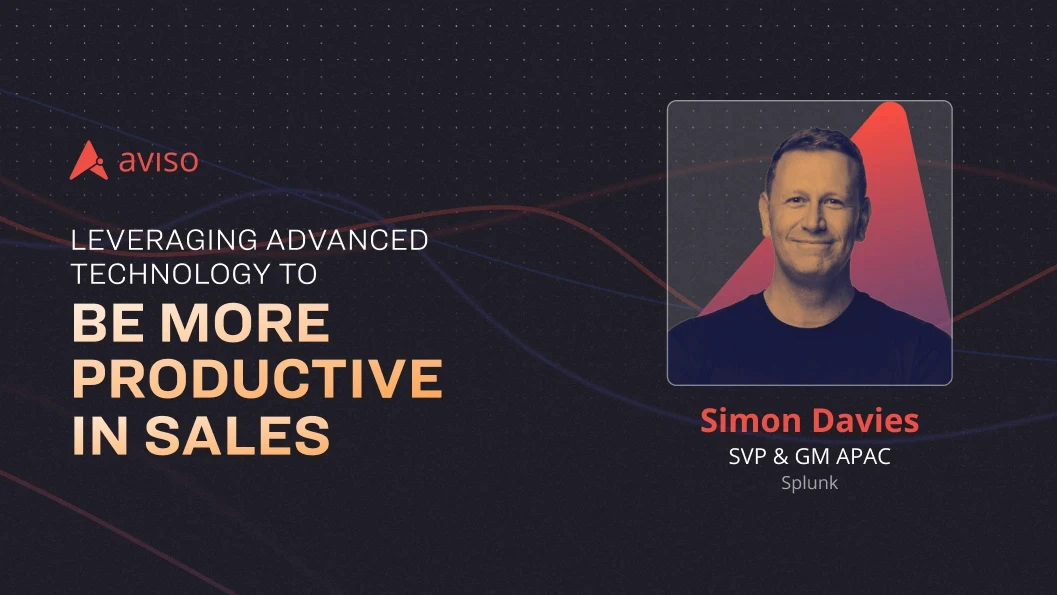Simon Davies: Leveraging Advanced Technology To Be More Productive In Sales
Apr 28, 2022

Simon Davies
SVP & GM APAC, Splunk
As part of Aviso's Revenue Navigators Series, we spoke with Simon Davies, the SVP & GM APAC of Splunk. Headquartered in San Francisco, CA, with over 7,500 employees, Splunk is the data platform leader for security and observability. This post is the second of three segments breaking down Simon’s interview with Aviso. As a business leader with extensive experience in selling and implementing IT solutions, Simon spoke out about how advanced technology can be used to enhance sales, and how sales organizations need to shift from the inspection mindset to a review, coaching, enablement, and acceleration approach.
Aviso: How does technology help get more insights from data in the world of sales?
Simon Davies: The journey that I've been on for 25 years in IT has seen a shift where the location of data has become less relevant than the ability to orchestrate it. This is true across all applications. But specifically, as you start to think about a sales process, the ability to bring data from many different places and use that information to predict how sellers should act becomes increasingly important. This allows managers not only to coach their sales team on what works but also to test new strategies until they find something that will work best for their specific company's needs.
This passage starts by discussing how customer interactions are now being scanned for sentiment analysis. This is an incredibly insightful way to identify potential risks and opportunities in your business strategy, which would have never occurred if we had not seen it coming years ago with conversational intelligence (CI). The modern company needs to take advantage of data. It's not just something that is there, waiting for you or your team members' convenience; it’s actually information with immense value when harnessed properly and used insightfully.
This is where a tool like Aviso comes in because it allows us to pull all the signals together and distill them. This helps us use all the customer, sales, and deal-related data more effectively. There are multiple ways salespeople can use artificial intelligence (AI) to assess and identify risks. When it comes to sales engagement and coaching, leaders and managers could look at the content of meetings, emails, or phone calls for signs that something might be wrong with their employees' interactions, even before they express any concerns themselves. Sales teams need to be able to find leads and convert them into buyers. The signals from CRM will help you make better decisions about who is a good fit, where your resources should go, or even if something needs doing at all.
I'm excited about the future of augmented reality and what it will look like in terms of our processes, such as how people interact with their personal agents or corporate ones. I also can't wait to see how this metaverse evolves over time — so far from my experience, there are many possibilities.
Aviso: How can technology align different GTM teams to focus on the customer?
Simon Davies: The world has dramatically shifted away from selling products to customers and moved to a subscription-based model. In my earlier days, we used to have a CD delivered that had all the information about what was included in the software. The approach businesses need to take now is to deliver innovative services with continuous improvement.
As a result, there’s no longer just a sales cycle and post-sale service — there are several stages before customers are satisfied, which means that your entire process, including the GTM strategy, should work together as one unit for it all to be effective. The ability to see your customers through their entire lifecycle will allow you to not only provide better service but also increase your revenue. As the business grows, it is important that the GTM team continue investing in new ways of seeing what solutions might work for them and how best can help keep those customers coming back time after time.
The way our business has worked for the last few years is that we separate out post-sales activity into its own system. But I think, as an organization and with technology constantly evolving how things are done at times can change drastically if you're not paying attention to what's happening in your company or within your industry. A better approach would be looking towards integrating these two types of tasks together so they flow seamlessly from one another. This will lead us down a more successful path overall when it comes to making new opportunities happen.
Aviso: What are your tips for sales leaders to be more productive?
Simon Davies: The most valuable thing in business is your customer. The best way to keep them happy and coming back for more is by always putting their needs first. It's all about finding that balance between giving what they want without excuses and providing logical reasons as to why something can't happen. To make the customers happier, it is important that you remove any barriers your team may have and provide coaching support to both salespeople and customer representatives. In doing so they will become more successful and this success can then scale up throughout an organization.
So when it comes to Asia-Pacific, there are more differences than similarities between the teams. Each country in this region has its own unique attributes and ways of reacting that customers will encounter on a day-by-day basis, while they're here for business which can sometimes make communications difficult if not impossible. Making sure that you have an operating framework in place for your team to execute with comfort and surety is crucial. Set clear expectations early on, and be honest but also supportive to keep your team motivated.
We've been working hard at shifting the business away from a mindset of inspection and more towards one that focuses on coaching, reviewing, and enabling. This is exciting because it's what will make our teams successful in their own right. I've been in sales for many years now, and I can say that one of the most important things a team needs is time. We should make sure to use our resources wisely so we don't waste them on projects or goals which won’t get us anywhere fast, like those long meetings where no progress is made. Having great people is important, but it's not the only thing that makes an organization successful. If you can get your customer expectations and predictability right then other factors will fall into place for team members as well.
Conclusion
In this interview segment, Simon Davies spoke about how the world of sales has evolved since the advent of subscription-based services, and how getting data from different sources and providing signals to sellers and managers are critical for revenue teams to succeed. Simon also discussed how sales organizations can overcome challenges with resource allocation and break down internal silos when revenue teams are aligned on the outcomes they’re driving.
Aviso enables sales and go-to-market teams to close more deals and accelerate growth, and helps break down revenue silos with its AI-guided single pane of glass platform. Aviso analyzes structured and unstructured data across the sales lifecycle and proactively provides insight that helps enhance forecast accuracies, increase revenue, and win deals on time.
If you are interested in following Splunk's decision to go with Aviso's time series revenue platform, please sign up here. You can also read other customers' success stories here.







